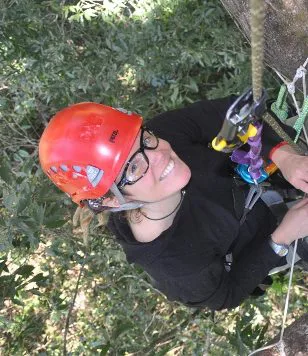Sybil G. Gotsch

Sybil G. Gotsch
about
Profile
As soon as I got to Australia and spent a few weeks there, I thought, this is it. This is what I want to do. It showed me what it is really like to live at a field station, and you don’t get that back at college.
SFS PROGRAM: Rainforest Management Studies | Australia | Spring 1996
HOME SCHOOL WHILE AT SFS: Mount Holyoke College
CURRENT POSITION: Associate Professor of Biology, Franklin and Marshall College
“I remember one day,” recalls Sybil Gotsch, “when we were visited by a cassowary. That was pretty special. I was doing a succession research program with three other classmates and one afternoon, we were in the forest, doing our thing, really focused on the work we were doing, and then this huge massive, majestic, and also scary creature just came rambling up the trail. We looked at each other and said ‘What do we do? Try to look big!’”
Sybil is now an assistant professor of biology at Franklin and Marshall College, and an accomplished tropical ecology field researcher, and she credits The School for Field Studies (SFS) with helping her to find her path.
As a biology major at Mount Holyoke College, Sybil struggled with the decision of where to study abroad. She was drawn to the hands-on, field programs that The School for Field Studies offered, but she was torn between one program in the temperate rainforest of British Columbia and another in the tropical rainforest of Australia.
Her decision to pursue studies with SFS in Australia set the course for her career. “I totally fell in love. As soon as I got to Australia and spent a few weeks there, I thought, this is it. This is what I want to do.”
The Australia rainforest students curriculum, as in all SFS programs, is designed to view environmental issues through a multi-disciplinary lens – a perspective that Sybil appreciated. “As a botanist, when I am in the forest I see familiar faces from the plants; and I am used to viewing the whole ecosystem through that specific filter. But at SFS, I felt like I gained a really broad perspective of the natural history of the rainforest. It was an opportunity for me to soak in everything that the forest had to offer, or at least, much more than I would have been able to do otherwise.”
Her current research takes her 100 feet off the ground, up in the canopy of the Costa Rican cloud forest of Monteverde, where she studies the physiology of epiphytes – bromeliads, orchids, and other non-parasitic plants that live on other plants – and the effects of climate change on this community of plants and the larger ecosystem.
“There are 800 species of epiphytes that live up in the canopy and many are endemic to this region. This community is perhaps a sentinel for what will come with changes in climate because they are disconnected from the ground, partially or completely, and so they are very vulnerable to any changes going on in the atmosphere.”
Due to climate change, the point where clouds come into contact with the mountains is moving up slope, and the community in the canopy feels the effects of those changes first. This has far reaching impacts for the entire ecosystem. The montane cloud forest is important for general hydrology in the area because they capture water from the clouds which can evaporate slowly through the dry season and provide much needed moisture at drier times of year.
For Sybil and her team, a typical day starts at 5:30am with breakfast followed by a meeting in the lab to determine their assignments. The field team might have up to a two hour hike to reach the study trees before hooking into their harnesses and climbing a hundred feet in the air. They spend the next several hours downloading data, collecting samples, and checking on equipment. The samples collected are then analyzed by the lab team on the ground.
Life at an international field research station has become “part of the job” for Sybil – whose experiences include stints at the Smithsonian Tropical Research Institute in Panama and a Harvard University/University of Costa Rica project in Guanacaste, Costa Rica in addition to her current work with Franklin and Marshall in Monteverde, Costa Rica. However, SFS Australia was her first introduction to this type of work.
“It was great to be able to combine birding at 4am with chopping firewood for our hot showers. It was that full living experience that I found to be really transformative for me. It showed me what it is really like to live at a field station, and you don’t get that back at college.”
September 2014